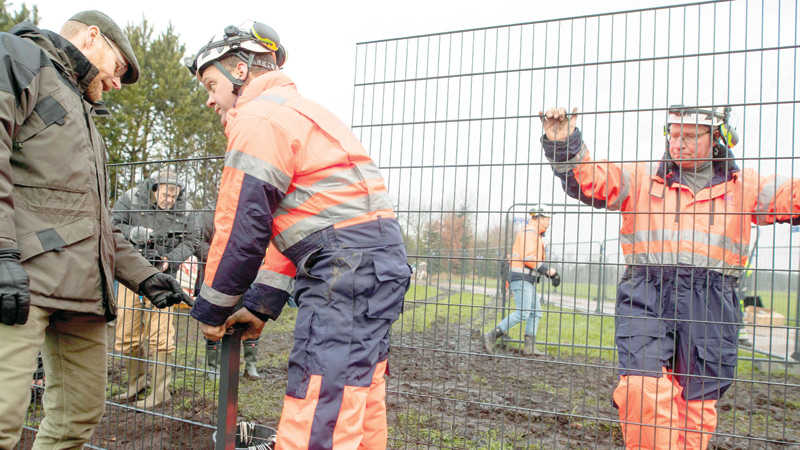

Copenhagen: Denmark on Monday began construction of a 70-kilometre fence on the border with Germany as part of efforts to combat the spread of African swine fever through wild boar.
The 1.5-metre high fence, which will run along the entire border between the two countries, is due to be completed by the end of the year.
Work on the initial sections of the fence, which was also to extend 0.5 metres underground, began near the town of Padborg, close to the German border town of Flensburg.
At the construction site, Mogens Dall - head of Danish farmers’ association Landbo Syd - stands on the muddy ground and looks contentedly at the work. “The fence is long awaited,” he said.
“Yes, there are gaps. We know this. But the boars are shy and nocturnal animals and where there are openings there is human movement and light.”
Dall does not believe that wild boars would choose this route across the border. And if so? “Then at least we do not have to be accused of not having tried everything,” he said.
African swine fever is not dangerous to humans, but is almost always fatal in pigs. There is no vaccine.
African swine fever has so far been detected in the Baltic States,Poland, the Czech Republic and Hungary. Cases in wild boar were also detected in Belgium last year.
Germany’s Friedrich Loeffler Institute for animal health says there is a high risk of the disease spreading to Germany.
According to the Danish government, if the virus were to spread to Danish stocks, all exports to non-EU countries would have to be stopped. The country exported pork worth 11 billion kroner to non-EU countries in 2016.
“We have 11 billion good reasons to do everything we can to prevent African swine fever reaching Denmark,” Jakob Ellemann-Jensen, minister for environment and food, said in a statement.
“The fence and our increased efforts to hunt wild boar will break thechain of infection so there is less risk of African swine fever spreading to Denmark,” he added.
Danish exports of pigs and pork were in 2016 worth a total of about 30 billion kroner ($4.6 billion).
A major outbreak would mean “ruin and unemployment for up to 33,000people” involved in various sections of the business, Dall said according to the Ritzau news agency.
Even if the fence does not offer full protection it will contributeto reducing the risk of wild boar spreading the virus, he added.
But not everyone is convinced.
“Large fences of hundreds of kilometres are highly vulnerable to wild boars and other species and can also raise natural conservation concerns leading to conflict of interest,” noted European Commission spokesperson Anca Paduraru.
“Additionally, feasibility, efficiency, cost benefits and predictability of implementation of such measures are an issue of concern. So building a fence today is neither an EU recommendation nor an option in general.”
Farmer Henrik Gotborg Hansen told Danish public broadcaster DR he was critical of the fence on his land. The farm has been in Hansen’s family since 1875.
“This reopens old feelings and problems, something happens to people when there is a physical border again,” he said.
Martin Ellermann, mayor of the German city of Harrislee, which lies along the border, is also not a fan.
“We just don’t think it’s appropriate,” he said, noting that the construction of the wall undercut attempts by the region to present itself as a place where people peacefully coexisted across the border.
The fence has gates and cattle grids at regular crossing points, and a 20x20 centimetre opening will be made every 100 metres to allow smaller animals to pass.
Other measures in Denmark to combat African swine fever include raising fines for insufficient disinfection of vehicles transporting livestock, easing wild boar hunting regulations, and more information about how to prevent the spread of the virus.
Some German lawmakers have criticised the border fence, claiming the virus is instead spread primarily during the transport of animals and by infected food. — dpa
Oman Observer is now on the WhatsApp channel. Click here



